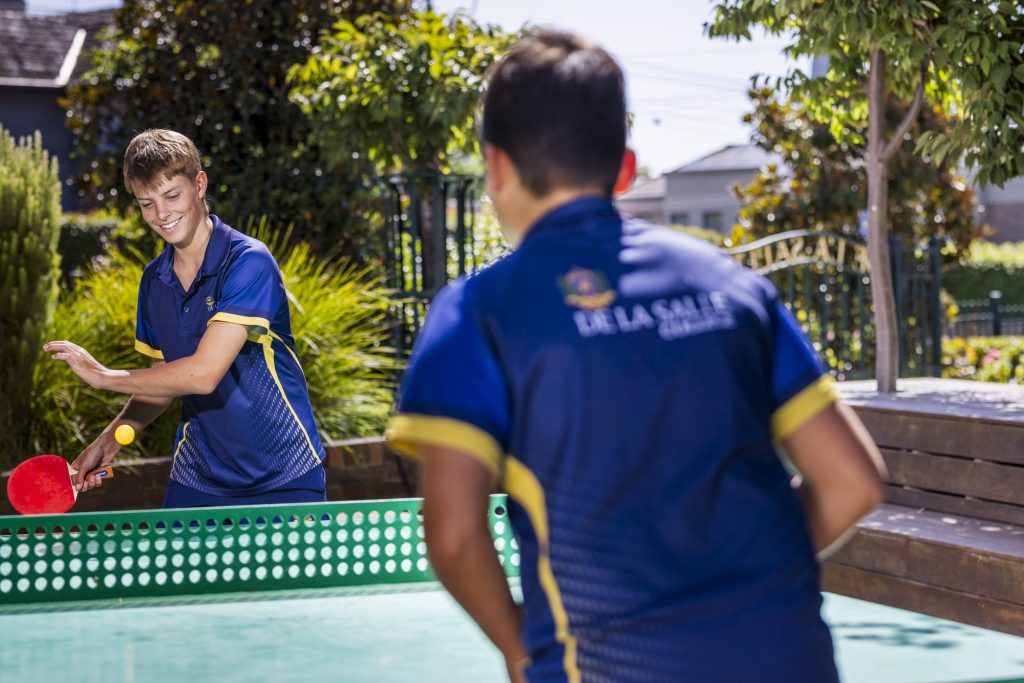Student Wellbeing
At De La Salle College, the wellbeing of each student is our paramount concern. We understand that wellbeing is a multifaceted concept, encompassing both physical practices and mental perceptions. Our holistic approach ensures that students are nurtured in body, mind, and spirit, enabling them to thrive academically, emotionally, and spiritually.
Our College is committed to fostering an environment where students can achieve their full potential in an atmosphere of mutual respect, cooperation, and support. This nurturing environment allows our students to grow confidently as curious, inspired learners, equipped with skills for problem-solving, conceptual thinking, and self-motivated learning.



Holistic Wellbeing Initiatives
At De La Salle College, our mentorship program is at the core of student wellbeing. Every student connects with a dedicated mentor teacher, ensuring personalised support. Mentor meetings at the start of each day foster a supportive community and prepare students for daily success.
- Years 7 to 9 – Mentor groups are class based and therefore made up of students from within a single year level.
- Years 10 to 12 – Mentor groups are formed within the House system and include students from across each year level.
The same mentor teacher journeys with those students throughout their years at the senior campus ensuring them a personalised relationship, support and guidance.
The House System: Our unique House System fosters a deep sense of belonging and community spirit, contributing to a supportive and engaging school experience. This system extends into various co-curricular activities, enriching our students’ school life.
Health Centre: The College boasts a fully equipped Health Centre, staffed by qualified professionals and closely integrated with our pastoral care network, including College Psychologists and educational leaders.
College Psychologists: Our team of accredited College Psychologists offers comprehensive support, ranging from individual counselling to educational and psychological assessments. They are adept in various therapeutic approaches, ensuring that each student’s unique needs are met. The range of services offered by our School Psychologists includes but is not limited to:
- Mental Health Support: Addressing issues such as anxiety, depression, and stress management.
- Behavioural Difficulties: Assisting students in managing and overcoming behavioural challenges that may impact their academic and social life.
- Relationship Counselling: Providing guidance and support for issues related to peer and family relationships, fostering healthy and positive interactions.
- Trauma and Grief Counselling: Offering sensitive and specialised support for students dealing with traumatic events or loss, helping them navigate these challenging experiences.
In cases where the needs of a student or their family extend beyond the scope of our College Psychologists, we ensure a seamless referral to appropriate external services. This referral process is handled with utmost care, and our support for the student continues actively during this transition.
Student Leadership: Leadership development is integral to our ethos. We offer diverse opportunities for students to explore and enhance their leadership skills, embodying the Lasallian principles of service and community engagement.
Transition Support: We understand the challenges of transitioning between educational stages. Our Transition Program is meticulously designed to equip students with the skills needed to confidently navigate these changes, ensuring a smooth and supportive progression through their schooling journey. Please click here for detailed information on our Year 7 Transition Program.
Safe Spaces: Championing Anti-Bullying Initiatives
At De La Salle College, we are committed to fostering a safe and inclusive environment where every student feels respected and valued. Our approach to addressing bullying is proactive and holistic, integrating principles of empathy, compassion, and accountability. Through comprehensive education programs, restorative justice practices, and strong partnerships with students, parents, and staff, we strive to prevent incidents of bullying and provide support to those affected if situations do arise.
By upholding the dignity of each individual and promoting a culture of mutual respect, we aim to empower our students to stand up against bullying and cultivate a community of kindness and understanding.
To discover more about our Anti-bullying Policy (including Cyberbullying), please refer to policy below.
Child Safety Commitment:
De La Salle College is committed to child safety, maintaining a zero-tolerance approach to child abuse. We treat all allegations and safety concerns seriously, adhering to robust policies and procedures.
Explore Our Policies:
- Please view our child protection policies here.
At De La Salle College, we are dedicated to fostering an environment where students can flourish, grow in confidence, and become curious, optimistic, and inspired learners.

